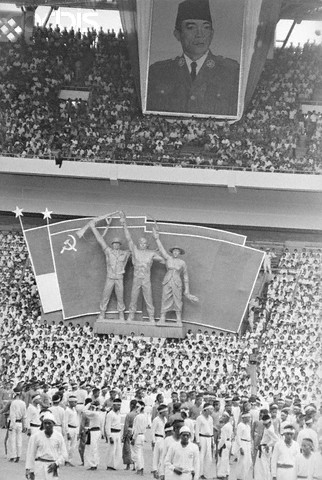
1965 -- May Day rally of CPI supporters
This article appears in Monthly Review — covering a historic event that marks a bitter and important experience for the communist movement.
by Nathaniel Mehr
“The people do not want Marxist-Leninist theses. They want, instead, improvement in their lot.”
This was the stark assessment of Dipa Nusantara Aidit, who acceded to the leadership of the Indonesian communist party (PKI) in 1951 and set about transforming the party’s fortunes by appealing to Indonesia’s rural peasants and challenging the received wisdom about the role of Marxist parties in the post-colonial world. In Aidit’s view, Indonesia’s status as a newly-independent nation under threat from neo-colonialist external forces called for a revision of orthodox approaches concerning the irreconcilability of class antagonisms. Indonesia’s bourgeoisie was itself “being oppressed by foreign imperialism,” and could therefore, “under certain circumstances and within certain limits, participate in the struggle against imperialism.” Aidit set out the core of his thinking in The Road to People’s Democracy for Indonesia (1954): the party’s alliance with the bourgeoisie would be mirrored by “the firm unity between the peasants, the largest and most oppressed group of the Indonesian people.”
Aidit’s approach drew him into an open ideological conflict with the USSR. During this period, the Soviet Union was pursuing a pragmatic policy of supporting non-communist governments in the underdeveloped world, provided that they were prepared to break ties with the West and establish new bonds with socialist states. This policy, which tended to manifest itself in Russian support for bourgeois — often very conservative — regimes, was attacked by the Chinese as a sell-out of national liberation movements and socialist movements across the underdeveloped world. Joining this attack, Aidit questioned whether the government in Moscow could rightly call itself socialist: “A socialist country cannot be counted as one if it does not come to the aid of the struggle for independence.” Yet there was undoubtedly something of the Moscow line in Aidit’s own policy of seeking cooperation with Indonesia’s staunchly conservative establishment under Sukarno. Aidit’s insistence that, under Sukarno, the Indonesian state’s “progressive aspect” had become its “main aspect,” effectively characterized the Indonesian nation as an exceptional case in modern world history, drawing criticism from contemporary observers, who considered that the Indonesian army, with its largely anti-communist leadership, remained the country’s most powerful political force.

